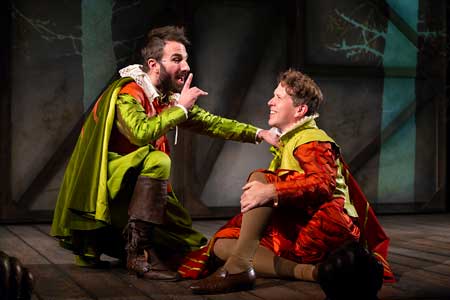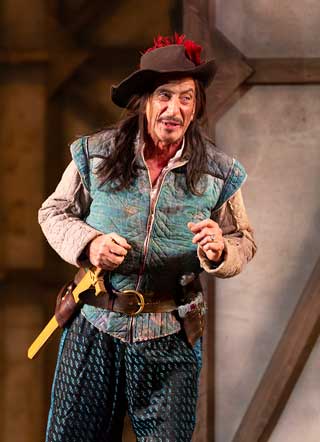Play (1966)
by Tom Stoppard
Directed by Peter DuBois
Huntington Theatre Company
Huntington Avenue Theatre
Symphony Hall area, Boston
September 20 – October 20, 2019
Scenic Design: Wilson Chin; Costume Design: Ilona Somogyi; Lighting Design: David Lander; Original Music and Sound Design: Obadiah Eaves; Projection Design: Zachary G. Borovay
With Alex Hurt (Rosencrantz), Jeremy Webb (Guildenstern), Will LeBow (Player), Matthew Bretschneider (Alfred), Laura Lateille (Tragedian), Zaven Ovian (Tragedian), Marc Pierre (Tragedian), Dale Place (Tragedian), Omar Robinson (Tragedian), Michael Underhill (Tragedian), Brian Lee Huynh (Hamlet), Meghan Leathers (Ophelia), Ed Hoopman (Claudius(, Melinda Lopez (Gertrude), Kadahj Bennett (Fortinbras), Ken Cheeseman (Polonius)

Jeremy Webb as Guildenstern
in “Rosencrantz and Guildenstern Are Dead”
Photo: T. Charles Erickson
Courtesy of Huntington Theatre Company
Rosencrantz (Alex Hurt) and Guildenstern (Jeremy Webb) barely show up in Hamlet, and when they do they are merely victims of an evil plot. Commandeered to lead young Hamlet to his death in England they unwittingly succumb to a reversal. In Stoppard’s replay of the whole set of goings-on, the plot is the same, but Rosencrantz and Guildenstern are the main characters having to undertake a journey and face a fate they don’t quite understand.
This was Stoppard’s first big hit, back in the mid-1960s when he was in his late twenties. He’d had some early success with The Real Inspector Hound, a cleverly warped whodunit, but he really made his name with Rosencrantz and Guildenstern Are Dead.
The play is unremittingly witty, and, by the rules of British drama and British humor, Stoppard was allowed to have his authorial way and pour out one clever line after another and expect that audiences would lap it up. Largely they did. But, as well, Stoppard’s plays, particularly the early ones, have some reputation for being balls of rapid-fire verbiage, focused more on witticisms than on character or substance.
The current production of this Stoppardian wit-fest does, however, does a remarkable job of making all of it seem passionate and relevant and in the service of issues of depth and character. With expert direction by Peter DuBois, excellent acting and wonderful staging, the show puts the wordplay in enough context, and gives it enough shape, that it conveys heft.
Consequently, one comes away from the show with the sense that its core is not merely empty conceptual banter for its own sake, but a tale of relationship that employs banter as its means. That’s a pretty big deal, and makes the difference between flat and distant characters who fire lines at one another and characters who exchange pointed lines but do it with a deep sense of connection.
Beckett is always in the background here, and the echoes of Waiting for Godot can be heard throughout. Yet, as this production brilliantly brings to the fore, the two main characters are deeply enmeshed together in the confrontation with emptiness and fatalism and consequently share a deep bond. The Stoppard script echoes with a bit more of philosophic verbal slapstick than Beckett’s does, but it also provides a bit more room for the sort of close bond that the two principals exhibit; in Godot almost all of the relationships are ironic rather than connected.
The scenic presumption of this production is to convey a sense of the happenings going on backstage at a production of Hamlet. That’s a clever adaptation of the original, quite consistent with what Stoppard’s general intent seems to be, but which adds some semiololigical complexity to the original script.
Part of the charm of that original script is the sense of entering the “real” world in which Rosencrantz and Guildenstern operate. It’s as though Stoppard placed us in “Hamletworld” apart from the particularities of Hamlet itself and lets the characters in the play, and us as viewers, roam around in it freely.
The reminder that this is a backstage phenomenon makes one, indeed, think of the “realities” of the performed construct and to think more about what it might mean for a character to be locked into that and yet portrayed as a thinking and suffering being.
If one doesn’t take that backstage pretense too seriously, it seasons and embellishes all the other allusions to the defined quality of the space in which the play and characters come to life and gives us the opportunity to think a bit more about how even these frail fictions create, with their passionate interchanges, the sense of a real human bond.
The two principals, Alex Hurt (Rosencrantz) and Jeremy Webb (Guildenstern) are wonderfully playful, adept at entertainment, and also evoke a real sense of connection with one another. Their sharp and pointed interchanges help create the fine shape of the production but the sense of bonding and mutual undergoing they convey is the real gift of their renditions.

in “Rosencrantz and Guildenstern Are Dead”
Photo: T. Charles Erickson
Courtesy of Huntington Theatre Company
As the play leader, Will LeBow is amazingly resonant, spry, and hilarious. His framing of the troupe leader as a serious clown is supremely fitting, and the combination of his reverberant voice and his wry stances make for a great character. His carrying off of the famous death scene is hilarious.
Other great actors fill in at various points. Ed Hoopman who also has a resonant baritone almost makes one want to continue to listen to his Claudius, even though he’s a heel. And though she doesn’t have much to say, Melinda Lopez’s Gertrude is a welcome addition. Ken Cheeseman, well-known for his many comedic Shakespearean roles around town, does a fairly serious Polonius but tinged ever so slightly with subtle Cheesemanesque humor.
Sets and design are dynamic, evocative and wonderfully conceived. Everything from mock stage panels to a glowing moon prevail and it makes the play seem grand. With so much knotty dialogue one’s attention might easily flow into a small pool, but Wilson Chin’s stage designs keep one’s eyes broadly aware and open to everything.
This is a wonderfully generous interpretation of the Stoppard classic which ensures that its best qualities prevail – that the wit is preserved but that it does not overcome the human qualities that resonate throughout.
– BADMan
Leave a Reply